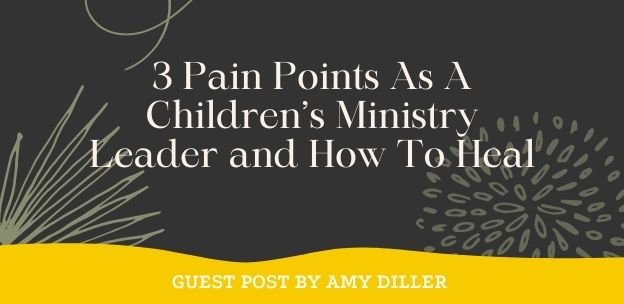3 Pain Points As A Children’s Ministry Leader and How To Heal
I’ve started and stopped writing this so many times. I’ve erased entire paragraphs…multiple times. Not because church hurt in ministry is a foreign concept, but because it’s way too familiar. Some of it is still pretty fresh, and I’m working through it. Those of us in children’s ministry understand the wonderful joy of seeing kids grow in their relationships with the Lord, and at the same time, we know what it’s like to experience hurt in an often invisible ministry.
Working at a church seems like it should be better than a secular workplace–after all, who wouldn’t want to be surrounded by fellow Christians every day? And it is a great environment, but we’re still flawed people. Sometimes we don’t get along. We experience misunderstandings and get angry with each other. Words and actions aren’t always gracious. Being on staff at a church isn’t much different than any other place of employment, except our expectations of fellow Christians are higher than those of non-Christians. It’s so easy to be caught off guard when thoughtless words or actions toward us or our ministries. Whether subtle or blatant, it hurts…a lot.
Children’s ministry is a high calling. We are given the privilege and the responsibility of coming alongside families to help establish a solid biblical foundation in the lives of kids. A child’s perception of church develops when they’re very young, and it often impacts the way they view church as they reach adolescence and adulthood. Statistics reveal a large number of people who accept Jesus as their Savior make the decision in childhood. Children’s ministry’s investment in the lives of families and kids is crucial. Many do recognize its importance, but some overlook this vital ministry because they have little to no direct involvement or lack the understanding that children aren’t lesser members of the body because they’re young. A person’s attitude toward children’s ministry affects the way they communicate with its leaders, resource the department, and recognize its important place in the church whether a conscious or unconscious belief system, the power to hurt leaders is there.
There are three specific areas I want to focus on where we can experience the sharp sting of hurt from leadership, fellow staff members, or church attenders–Resources, Representation, and Respect.
1. Resources
When working with kids, you develop the ability to look at everything as a potential craft, prop, or decoration. We’re also really good at being frugal and spending church money wisely, and we love donations! It’s not unusual to get regular calls from people asking if we could use this or that. Many things we receive are in great condition, and we’re so thankful for the generosity of others. However, there are items that come to us dirty and in disrepair. In order to use them, it requires a lot of time to clean and fix them, and we all know time is a very precious commodity. When this happens, it feels like people don’t care what they give us, and we can’t help but ask if they’d do the same if donating an item to the senior pastor. Children deserve better than that.
Sometimes there are notable differences between the amount spent to keep teen and adult ministries relevant in both style and technology while the kids’ department gets hand-me-downs of hand-me-downs. The attitude this can convey is that it doesn’t matter if equipment and supplies are worn out and don’t always work properly if it saves money. After all, kids aren’t going to notice or care as much as adults will, right? When budgets allotted to similarly-sized departments are inequitable, it feels like what we do is less important. It communicates that children’s ministry stands on a much lower rung on the ladder. When the people you devote your time and energy to are treated in a less-than way, it’s hard not to feel like your ministry is overlooked and disregarded.
2. Representation
A couple of sayings come to mind when reflecting on the different ways people view the place of children in church. One is ‘Children should be seen and not heard.’ As long as they’re quiet and don’t disrupt others, it’s okay for them to be present. Another is ‘out of sight, out of mind.’ If we don’t see them or hear them, children can easily be forgotten. Both of these sayings express that children are often seen as a distraction and a bother.
In too many churches, kids are often underrepresented in the regular functions of the church body because they’re not yet old enough to really be part of the body. It’s always received positively when kids make appearances on special Sundays–waving palm branches on Palm Sunday or singing a Christmas carol during the holidays. Everyone likes seeing their cute faces and funny quirks. However, when a church follows a strict, minute-by-minute program for service times, involving children can throw things off schedule; inviting them to take part more often is too unpredictable. It’s far easier to hold completely separate worship and teaching for children than it is to include them more regularly.
This is a harder hurt to process than lack of resources because it undermines the purpose of children’s ministry. When we serve children and families by supporting parents in their biblical role as primary spiritual leaders in the home, it’s difficult to do it in an environment that says otherwise. There’s a need for generations to spend time with their peers, but there’s also a need for generations to have time to worship with one another. As much as older adults can set a godly example for children, kids have the same ability, too. When children are underrepresented in what are considered to be adult-only spaces, we all miss out on the things kids have to teach us through their relationships with the Lord.
3. Respect
We all bring a unique set of skills to the table–years of experience, college degrees, God-given talents. We weren’t offered church positions because we lacked the ability to do our jobs well. Yet, in some places, the knowledge we bring isn’t regarded like that of those who lead adults. Somehow working with children excludes us from having valuable input on matters both inside and outside of children’s ministry. When discussions and decisions are made about kids without our voices adding to the conversation, it communicates a lack of respect. Our grasp of the Bible is viewed differently because people think we tell stories to kids rather than having to have a deep understanding of scripture to prepare lessons for those learning foundational truths. It’s like we’re automatically given a spot at the kids’ table instead of being invited to sit with the adults.
This hurt can cut deeper because it centers around the core of who we are. It can make us question ourselves and even our calling. Not only do we feel like we serve invisibly, we feel like we are invisible. Every person longs to be heard, to be appreciated, to be valued. When we’re viewed as needing to be lead instead of being fully capable leaders, it’s disrespectful. And it makes it more difficult to maintain respect for those who lead us when that respect isn’t reciprocated. Such a personal wound, whether intentional or unintentional, often takes more time to heal and reconcile.
Healing And Hope
We can deal with church hurt in different ways. Human tendency tells us to hold tightly to our pain. This unhealthy response encourages us to go looking for offenses to feed and fuel our bitterness. Not only does bitterness affect us inwardly, but it also colors our view of people and the church, spilling out into our relationships with others and with the Lord. Refusing to let go of our hurt snowballs into all kinds of trouble.
Instead, we need to first lean into the Lord. Asking Him to bring clarity and to give wisdom on how best to handle these situations is the healthiest place to start. Finding a trustworthy and objective person or group, whether it’s a licensed therapist or a group of peers, that’s not linked to your church body is often a great resource. Even though it seems natural to turn to church friends or fellow staff members, sharing our negative experiences can be detrimental. One experience of woundedness doesn’t mean everything and everyone in our church body is awful. When we’re hurting, we don’t want to represent others unfairly or paint the church in a negative light. Online communities of ministry leaders or leaders you’ve connected with at conferences often provide support and encouragement from an understanding yet removed perspective.
Be assured that you are not alone if you’ve felt invisible, undervalued, or disrespected in children’s ministry. There are others who have walked or are walking through painful situations of church hurt. Most importantly, we serve a God who desires to see healing in our lives and in our relationships.
Amy Diller began her career as an elementary teacher before moving into her current role of Co-Director of Children’s Ministry at Colonial Woods Missionary Church in Port Huron, MI. She is a life-long Michigander, wife to Jason, and mom to two college-aged daughters. Amy loves the smell of a new box of crayons, the feel of a book in her hands, and experiencing God’s Word through the eyes of kids. You can contact Amy at amy@cwmc.church.
To view more from the How To Heal From Church Hurt Series, check out our podcast:
#049: How To Heal From Church Hurt: Interview With Jeremy Lee
#050: How To Heal From Church Hurt: Interview With Elisabeth Lee
Connect with your parents in less than five minutes!
Download & send these digital resources to your parents.
A PRAYER GUIDE FOR YOUR FAMILIES & 2 PARENT VIDEOS.


